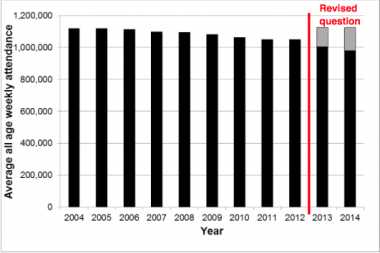There are more people going to Church schools than CofE churches in England
More pupils attend Church of England schools than people attend Church of England churches each week.

The Church of England released statistics for 2014 on Tuesday. The British Humanist Association (BHA) has now highlighted that while 980,000 people attended CofE churches each week in 2014, the number of pupils enrolled in CofE schools was 1,027,584.
Pupils at CofE schools take part in a daily act of worship, which the BHA has said indicates the "increasing absurdity of the influence that religious groups have over our schools."
"Setting aside what these latest attendance figures say about the claim that England is still a 'Christian country', it's incredibly alarming that the Church has been able to increase its grip on the education system despite representing fewer and fewer people year on year," Richy Thompson, BHA campaigns manager, said.
Referring to the fact that some parents attend church in order to gain a place at a Church of England school, he said "it is wholly inappropriate for the churches to be using schools as a recruitment tool and a means to fill their pews in the face of dwindling numbers."
"Given these figures, the proliferation of 'faith' schools can only lead to a less fair, more discriminatory future, and we will certainly be using them as we continue to campaign for a secular and inclusive system."
However, a spokesperson for the Church of England told Christian Today that "church attendance statistics tell only part of the story".
"Central to spiritual and physical recovery in times of crisis such as the recent floods in the north of England, offering hubs for community groups, educating generations of our citizens whether of faith or of none, the Church also fights to improve the lives and prospects of millions through social action campaigns such as the LifeSavers programme."
During a speech to the Primates meeting in Canterbury this week, the Archbishop of Canterbury Justin Welby admitted that the Church's hostility to gay marriage has had significant consequences on the number of people attending services, however he also said that the numbers were "made to look a little worse by a change in the way we count people."
The Bishop of Norwich Graham James said, "There are many things that churches do that are not included in these data from running homelessness services and hosting foodbanks, to educating a million children a day in our schools to providing welcome and accompaniment to the least, the last and the lost in our society."
"As a Church we are unashamedly committed to following the teachings of Jesus Christ in our worship of God, discipleship and service to the poor and the marginalised," he added. "Our confidence, resilience and service is rooted in Jesus."
Furthermore, the Church is not facing inevitable decline, James said. During 2013-14 some dioceses saw their attendance figures increase.
"In the past 12 months alone there are examples of growth and new churches across the country. In my own diocese the church of St. Thomas Norwich has grown from 50 to 450 people in the past two years. In Bournemouth, St Swithin's – a church which started in 2014 – now sees 500 people attending every week whilst in Birmingham St Luke's Gas Street is already attracting hundreds of young people since its beginning in 2015. There are many others like these and each is a sign of hope," he said.











